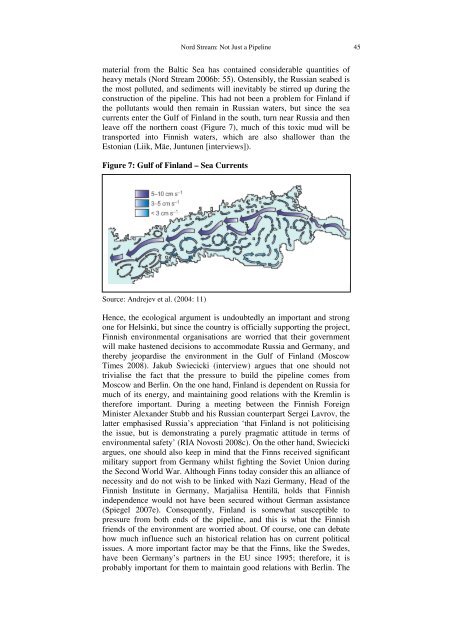Nord Stream: Not Just a Pipeline
Nord Stream: Not Just a Pipeline
Nord Stream: Not Just a Pipeline
Create successful ePaper yourself
Turn your PDF publications into a flip-book with our unique Google optimized e-Paper software.
<strong>Nord</strong> <strong>Stream</strong>: <strong>Not</strong> <strong>Just</strong> a <strong>Pipeline</strong> 45<br />
material from the Baltic Sea has contained considerable quantities of<br />
heavy metals (<strong>Nord</strong> <strong>Stream</strong> 2006b: 55). Ostensibly, the Russian seabed is<br />
the most polluted, and sediments will inevitably be stirred up during the<br />
construction of the pipeline. This had not been a problem for Finland if<br />
the pollutants would then remain in Russian waters, but since the sea<br />
currents enter the Gulf of Finland in the south, turn near Russia and then<br />
leave off the northern coast (Figure 7), much of this toxic mud will be<br />
transported into Finnish waters, which are also shallower than the<br />
Estonian (Liik, Mäe, Juntunen [interviews]).<br />
Figure 7: Gulf of Finland – Sea Currents<br />
Source: Andrejev et al. (2004: 11)<br />
Hence, the ecological argument is undoubtedly an important and strong<br />
one for Helsinki, but since the country is officially supporting the project,<br />
Finnish environmental organisations are worried that their government<br />
will make hastened decisions to accommodate Russia and Germany, and<br />
thereby jeopardise the environment in the Gulf of Finland (Moscow<br />
Times 2008). Jakub Swiecicki (interview) argues that one should not<br />
trivialise the fact that the pressure to build the pipeline comes from<br />
Moscow and Berlin. On the one hand, Finland is dependent on Russia for<br />
much of its energy, and maintaining good relations with the Kremlin is<br />
therefore important. During a meeting between the Finnish Foreign<br />
Minister Alexander Stubb and his Russian counterpart Sergei Lavrov, the<br />
latter emphasised Russia’s appreciation ‘that Finland is not politicising<br />
the issue, but is demonstrating a purely pragmatic attitude in terms of<br />
environmental safety’ (RIA Novosti 2008c). On the other hand, Swiecicki<br />
argues, one should also keep in mind that the Finns received significant<br />
military support from Germany whilst fighting the Soviet Union during<br />
the Second World War. Although Finns today consider this an alliance of<br />
necessity and do not wish to be linked with Nazi Germany, Head of the<br />
Finnish Institute in Germany, Marjaliisa Hentilä, holds that Finnish<br />
independence would not have been secured without German assistance<br />
(Spiegel 2007e). Consequently, Finland is somewhat susceptible to<br />
pressure from both ends of the pipeline, and this is what the Finnish<br />
friends of the environment are worried about. Of course, one can debate<br />
how much influence such an historical relation has on current political<br />
issues. A more important factor may be that the Finns, like the Swedes,<br />
have been Germany’s partners in the EU since 1995; therefore, it is<br />
probably important for them to maintain good relations with Berlin. The













